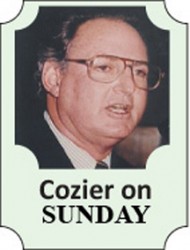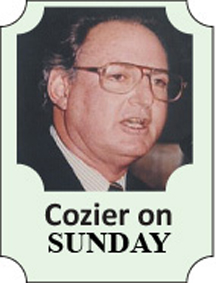By Tony Cozier
Whether the beleaguered, but defiant incumbent Dave Cameron was returned for a second term after yesterday’s presidential West Indies Cricket Board (WICB) election or Joel Garner became the first Test player since Sir Wes Hall in 2003 to head the organization is largely immaterial to the overdue revival of an entity once the pride of its passionate public and envy of the rest of the world.
Over two decades, the game in the West Indies has plummeted from the paramount standing of teams led by Sir Frank Worrell, Sir Garry Sobers, Clive Lloyd and Sir Viv Richards to virtual irrelevancy, languishing in the lower reaches of the International Cricket Council (ICC) table for Tests and ODIs.
On the eve of the latest election, a loss to India left them tottering on the cusp of first round elimination of the World Cup in Australia and India, an unprecedented embarrassment.
When he took up office in March, 2013, Cameron was the sixth president since the turn of the 21st century; there were seven chief executives in that time.
 The board has turned to a host of captains, eight of whom have led in 10 or more Tests, ten in 10 or more ODIs. In Cameron’s two years, Test and ODI captains were changed; the head coach was sacked with no replacement appointed.
The board has turned to a host of captains, eight of whom have led in 10 or more Tests, ten in 10 or more ODIs. In Cameron’s two years, Test and ODI captains were changed; the head coach was sacked with no replacement appointed.
Still, a recovery seems so far in the distance as to be out of sight.
The reality is that, as presently structured, the WICB is not the solution but the problem.
It remains comprised of two directors from its six constituent boards, Barbados, Guyana, Jamaica, Leeward Islands, Trinidad and Tobago and Windward Islands. Each board appoints two delegates to vote every two years for president and vice-president. Four non-voting directors were added six years ago, one representing CARICOM, two from private business, one female with a brief for the women’s game.
It is a recipe for individual territories to press their narrow interests above those of the great whole and for internal bartering that has little to do with reclaiming its former glory.
Every attempt to make the necessary changes have been resisted by WICB’s directors.
Seven years ago, they set up the Committee on the Governance of West Indies cricket, headed by P.J.Patterson, the former Jamaica prime minister.
One of the items on its agenda was to “consider the composition and structure of the WICB and to make recommendations which will improve its overall operations, governance, effectiveness, team performance and strengthen its credibility and public support.”
It proposed the formation of a West Indies Cricket Commission constituted by all major interest groups – territorial boards, players and officials, women, the Caribbean Community, the private sector and civil society – that would meet bi-annually to approve policies, programmes and budget.”
It was never implemented.
The WICB’s operations, governance, effectiveness, team performance, credibility and public support remain as weak as they have ever been. Patterson fumed that he had wasted three years of his life working on the report.
In 2013, the WICB mandated its governance committee, headed by Charles Wilkin, a Queen’s Counsel for St. Kitts and former Cambridge University and Leeward Islands left-arm spinner, to undertake a similar exercise to Patterson’s.
It cited the repeated turnover of presidents, chief executives, captains and players as “an indictment of the board of directors and justify substantial structural changes to the board.”
When he presented the report, Wilkin said he realized the directors “wanted to preserve at all costs all of their positions on the board.” Knowing that his committee’s work would inevitably head onto the same backroom shelf as Patterson’s, he promptly quit.
Several prominent voices have been raised over the years with the same submission – and the same response.
Vaneisa Baksh, a renowned writer on the game who edits UWI News, the publication of the University of the West Indies, chose to focus on the trials and tribulations of West Indies cricket in last week’s edition.
“We have wondered how we could replace the WICB with an entity that is not a private company, accountable to no one but itself,” she wrote and referred to an article by Dr. Kusha Haraksingh who believed a judgment by the Supreme Court of India involving the Indian board has “direct implications for the West Indies.”
The judgment read, in part:“Any organization or entity that has such pervasive control over the game and its affairs as can make dreams end up in smoke or come true cannot be said to be undertaking any private activity.”
The point was that, as the functions of the Indian board are clearly public, it should be “answerable on the standards generally applicable to judicial review of state (government) action”.
Baksh said it got her thinking.
“What if West Indian people who want to claim cricket could bring an action against the WICB to the Caribbean Court of Justice in relation to this (Haraksingh’s) extract from the (Indian) Supreme Court’s ruling?” she wondered.
“Might it not be a matter that says West Indies cricket administrators have gone against public policy and can we not petition the CCJ by way of a motion of no-confidence, or something else, to have the WICB stripped of its stranglehold on West Indies cricket?”
She acknowledged that it would require legal expertise to dot the Is and cross the Ts but she is obviously as exasperated as every West Indian fan at the state of affairs.
It’s a long shot but worth it.
Sports Editor’s note:
Incumbent Dave Cameron was reelected president of the West Indies Cricket Board after he defeated Joel Garner by eight votes to four.








